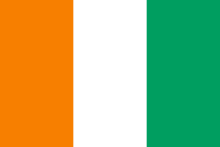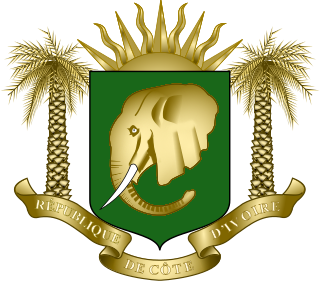
The Republican Forces of Côte d'Ivoire is the current name of the armed forces of Ivory Coast.

Ivory Coast or Côte d'Ivoire, officially the Republic of Côte d'Ivoire, is a country located on the south coast of West Africa. Ivory Coast's political capital is Yamoussoukro in the centre of the country, while its economic capital and largest city is the port city of Abidjan. It borders Guinea and Liberia to the west, Burkina Faso and Mali to the north, Ghana to the east, and the Gulf of Guinea to the south.
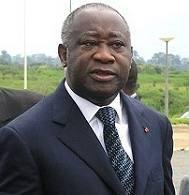
Koudou Laurent Gbagbo is an Ivorian politician who was the President of Côte d'Ivoire from 2000 until his arrest in April 2011. A historian, Gbagbo was imprisoned in the early 1970s and again in the early 1990s, and he lived in exile in France during much of the 1980s as a result of his union activism. Gbagbo founded the Ivorian Popular Front (FPI) in 1982 and ran unsuccessfully for president against Félix Houphouët-Boigny at the start of multi-party politics in 1990. He won a seat in the National Assembly of Côte d'Ivoire in 1990.

Departments of Ivory Coast are currently the third-level administrative subdivision of the country. Each of the 31 second-level regions of Ivory Coast is divided into two or more departments. Each department is divided into two or more sub-prefectures, which are the fourth-level subdivisions in Ivory Coast. As of 2016, there are 108 departments of Ivory Coast.

The First Ivorian Civil War was a conflict in the Ivory Coast that began in 2002. Although most of the fighting ended by late 2004, the country remained split in two, with a rebel-held north and a government-held south. Hostility increased and raids on foreign troops and civilians rose. As of 2006, the region was tense, and many said the UN and the French military failed to calm the civil war.
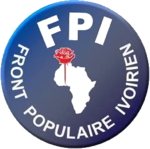
The Ivorian Popular Front is a centre-left, democratic socialist and social democratic political party in Ivory Coast.

The regions of Ivory Coast are the second-level subdivisions of Ivory Coast. There are 31 regions, and each region is subdivided into two or more departments, the third-level division in Ivory Coast. Two to four regions are combined to make up a district, the first-level subdivision. The two autonomous districts of Ivory Coast are not divided into regions.

The United Nations Operation in Côte d'Ivoire(UNOCI)(French: Opération des Nations Unies en Côte d'Ivoire, ONUCI) was a peacekeeping mission whose objective was "to facilitate the implementation by the Ivorian parties of the peace agreement signed by them in January 2003". The two main Ivorian parties here are the Ivorian Government forces who control the south of the country, and the New Forces, who control the north. The UNOCI mission aims to control a "zone of confidence" across the centre of the country separating the two parties. The Head of Mission and Special Representative of the Secretary-General is Aïchatou Mindaoudou Souleymane from Niger. She has succeeded Bert Koenders from the Netherlands in 2013 who himself succeeded Choi Young-jin from South Korea in 2011. The mission officially ended on 30 June 2017.
The Ivory Coast national rugby union team, nicknamed Les Éléphants, participates in the annual Africa Cup and are considered a third tier rugby team.

Opération Licorne was the name of the French Armed Forces's peacekeeping operation in support of the United Nations Operation in Côte d'Ivoire. The French forces have been stationed in the country since shortly after the outbreak of the Ivorian Civil War. The troops' main mission was to support the United Nations peacekeeping mission and to ensure the security of French and foreign nationals.
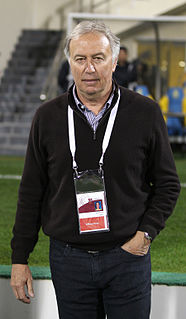
Gérard Gili is a French football manager.

The economy of Ivory Coast is stable and currently growing, in the aftermath of political instability in recent decades. The Ivory Coast is largely market-based and depends heavily on the agricultural sector. Almost 70% of the Ivorian people are engaged in some form of agricultural activity. GDP per capita grew 82% in the 1960s, reaching a peak growth of 360% in the 1970s. But this proved unsustainable and it shrank by 28% in the 1980s and a further 22% in the 1990s. This coupled with high population growth resulted in a steady fall in living standards. Gross national product per capita, now rising again, was about US$727 in 1996. After several years of lagging performance, the Ivorian economy began a comeback in 1994, due to the devaluation of the CFA franc and improved prices for cocoa and coffee, growth in non-traditional primary exports such as pineapples and rubber, limited trade and banking liberalization, offshore oil and gas discoveries, and generous external financing and debt rescheduling by multilateral lenders and France. The 50% devaluation of franc zone currencies on 12 January 1994 caused a one-time jump in the inflation rate to 26% in 1994, but the rate fell sharply in 1996-1999. Moreover, government adherence to donor-mandated reforms led to a jump in growth to 5% annually in 1996-99. A majority of the population remains dependent on smallholder cash crop production. Principal exports are cocoa, coffee, and tropical woods.

The 1999 Ivorian coup d'état took place on 24 December 1999. It was the first coup d'état since the independence of Ivory Coast and led to the President Henri Konan Bédié being deposed.

The 2010–11 Ivorian crisis was a political crisis in Ivory Coast which began after Laurent Gbagbo, the President of Ivory Coast since 2000, was proclaimed the winner of the Ivorian election of 2010, the first election in the country in 10 years. The opposition candidate, Alassane Ouattara, and a number of countries, organisations and leaders worldwide claimed Ouattara had won the election. After months of attempted negotiation and sporadic violence, the crisis entered a decisive stage as Ouattara's forces began a military offensive in which they quickly gained control of most of the country and besieged key targets in Abidjan, the country's largest city. International organizations have reported numerous human rights violations, and the UN undertook its own military action with the stated objective to protect itself and civilians.

The Second Ivorian Civil War broke out in March 2011 when the crisis in Ivory Coast escalated into full-scale military conflict between forces loyal to Laurent Gbagbo, the President of Ivory Coast since 2000, and supporters of the internationally recognised president-elect Alassane Ouattara. After months of unsuccessful negotiations and sporadic violence between supporters of the two sides, the crisis entered a critical stage as Ouattara's forces seized control of most of the country with the help of the UN, with Gbagbo entrenched in Abidjan, the country's largest city. International organizations have reported numerous instances of human rights violations by both sides, in particular in the city of Duékoué where Ouattara's forces killed hundreds of people. Overall casualties of the war are estimated around 3000. The UN and French forces took military action, with the stated objective to protect their forces and civilians. France's forces arrested Gbagbo at his residence on 11 April 2011.

Ivory Coast competed at the 2012 Summer Olympics in London, United Kingdom from 27 July to 12 August 2012. This was the nation's thirteenth appearance at the Olympics.
The Ivory Coast mud turtle is a species of turtle in the family Pelomedusidae. It is one of the most recently described turtle species. It is endemic to Ivory Coast(Côte d'Ivoire), Benin, Ghana, Liberia, Sierra Leone, and Togo in Africa.

Indénié-Djuablin Region is one of the 31 regions of Ivory Coast. Since its establishment in 2011, it has been one of two regions in Comoé District. The region's seat is Abengourou. Other important towns are Agnibilekrou, Bettié and Niablé. The region's area is 6919 km², and at the 2014 census, it had a population of 560,432.
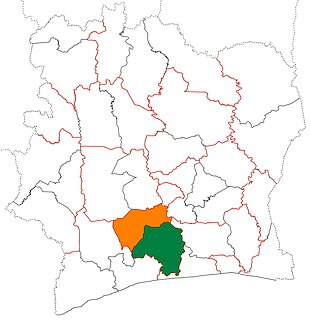
Lôh-Djiboua Region is one of the 31 regions of Ivory Coast. Since its creation in 2011, it has been one of two regions in Gôh-Djiboua District. The regional seat is Divo and the region's area is 10,650 km². At the 2014 census, the region had a population of 729,169.
